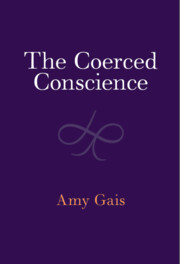Book contents
- The Coerced Conscience
- The Coerced Conscience
- Copyright page
- Dedication
- Epigraph
- Contents
- Acknowledgments
- A Note on Texts and Abbreviations
- 1 A New Kind of Politics?
- 2 John Milton and Expressive Conscience
- 3 Thomas Hobbes and Instilled Conscience
- 4 Baruch Spinoza and Conscientious Speech
- 5 Pierre Bayle and Tormented Conscience
- 6 The Politics of Conscience
- Bibliography
- Index
3 - Thomas Hobbes and Instilled Conscience
Published online by Cambridge University Press: 07 December 2023
- The Coerced Conscience
- The Coerced Conscience
- Copyright page
- Dedication
- Epigraph
- Contents
- Acknowledgments
- A Note on Texts and Abbreviations
- 1 A New Kind of Politics?
- 2 John Milton and Expressive Conscience
- 3 Thomas Hobbes and Instilled Conscience
- 4 Baruch Spinoza and Conscientious Speech
- 5 Pierre Bayle and Tormented Conscience
- 6 The Politics of Conscience
- Bibliography
- Index
Summary
Hobbes condemns liberty of conscience by stressing its incendiary repercussions on social stability and political sovereignty. Religious dissenters fashion themselves as sovereigns, emboldening them to do whatever they want rather than obey the state. For Hobbes, invocations to conscience are mere assertions of opinion – deeply held and felt, such that individuals insist on acting in accordance with them, but opinions nonetheless. While Hobbes anticipates the danger of liberty of conscience, he also offers a potential solution to this very problem – civic education – and invites us to reflect on how we might cultivate consensus through attempts to shape the conscience of dissenters. The possibility of peaceful co-existence becomes, at some point, about the project of persuasion, for Hobbes, such that invocations of conscience will abate over time and the threat of liberty of conscience to political authority may be tamed.
- Type
- Chapter
- Information
- The Coerced Conscience , pp. 41 - 68Publisher: Cambridge University PressPrint publication year: 2023

